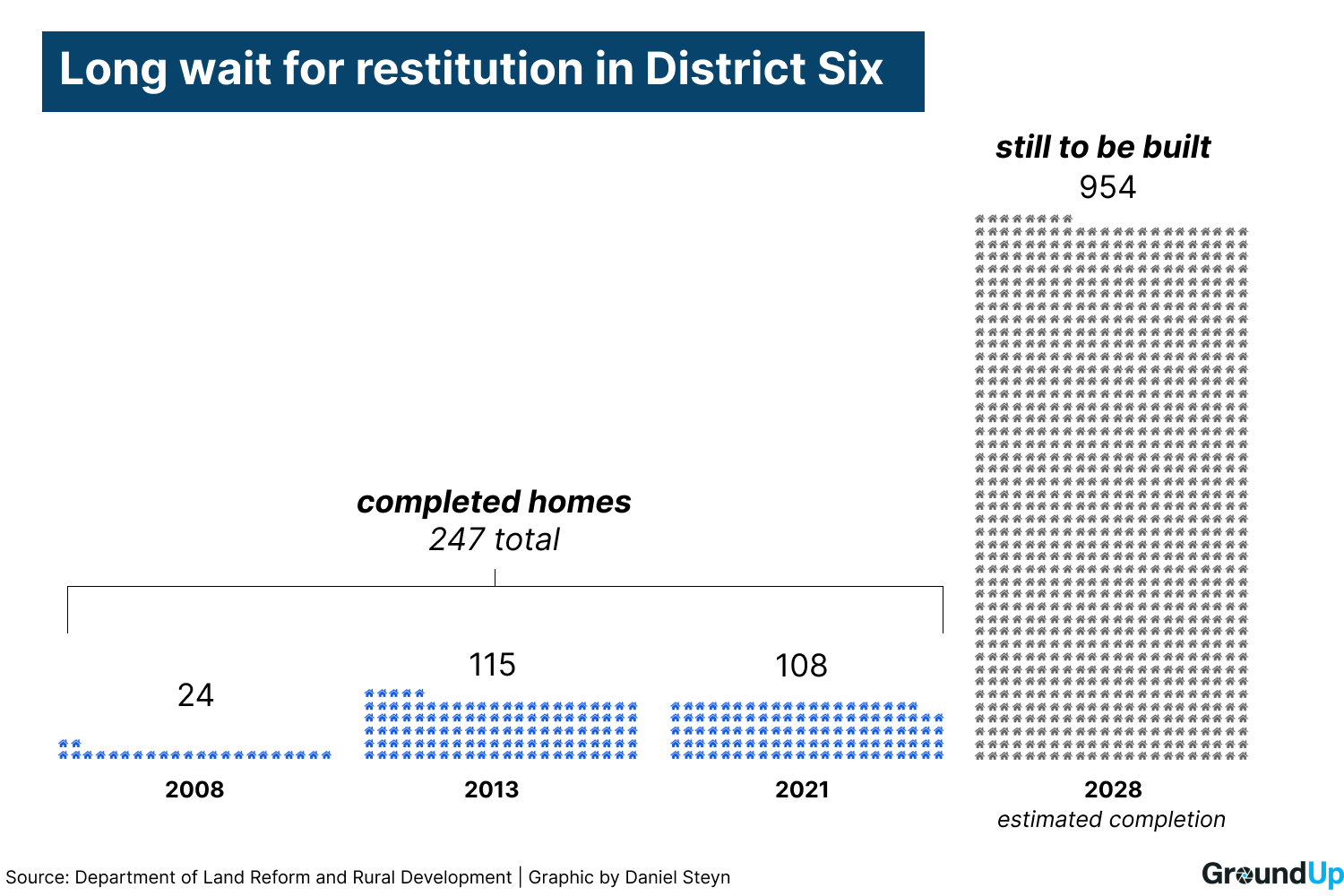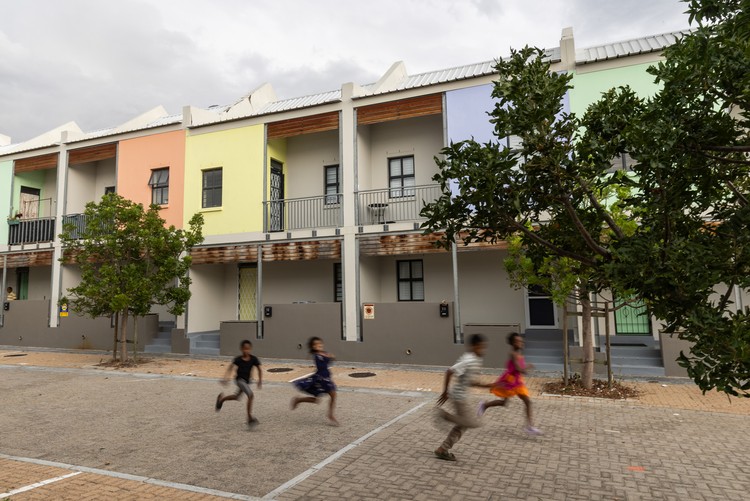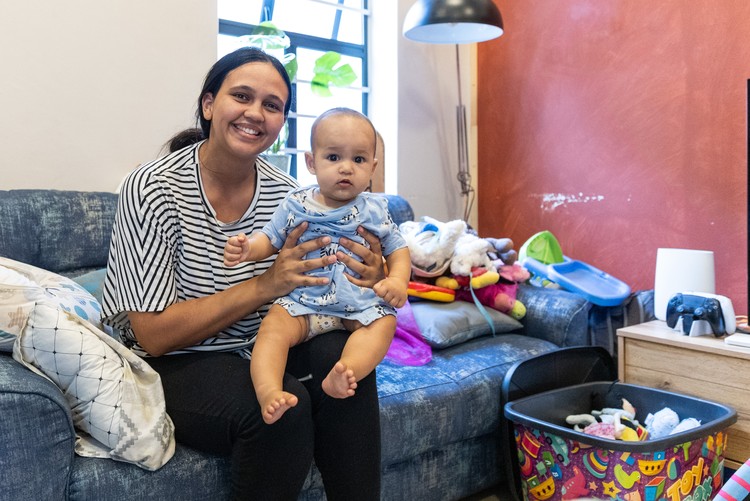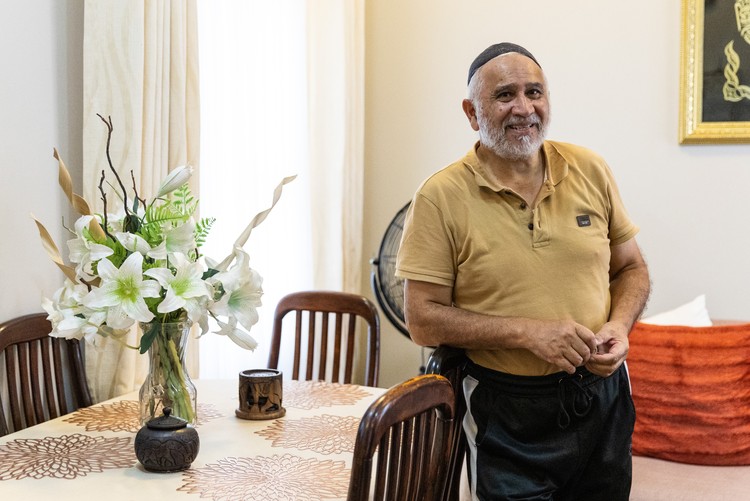District Six families must wait at least three more years to return
Government has not yet secured funding to build the houses
Children play in a parking area at Phase 3 of the redevelopment of District Six. The houses are among 247 that have been completed to date. Photos: Ashraf Hendricks
- 918 families who lodged land claims by the 1998 deadline are still waiting for houses in District Six.
- The government now says the houses will be completed by 2028, but it has not yet secured funding for the development.
- Only 247 houses have been built in the area since 1998.
Almost a thousand families who were forcibly removed from Cape Town’s District Six in the 1960s and 1970s because of the colour of their skin will wait at least three more years before they receive new homes in the area.
Of the 1,165 housing units supposed to have been built and handed to former District Six residents, only 247 have been completed to date. The Department of Land Reform and Rural Development now says the remaining units will be finished in 2028 — three decades after the former District Six residents lodged their claims with the department. But the department has not yet secured the R2.4-billion needed.
In 1966, District Six, then home to a vibrant community, was declared a whites-only area under the Group Areas Act. Between 1968 and 1978, more than 60,000 people were forcibly removed, many of whom moved to coloured areas on the Cape Flats. The original houses were bulldozed to make way for new developments for white residents and businesses. Large chunks of the area remain undeveloped and deserted.
“We thought we were going to retire there,” says Yusuf Albertyn who grew up in District Six but now lives in Kensington. His family lodged their claim before the 1998 deadline and thought they would be back within a few years. He is now 75 years old.
“There have been times where I got so fed up that I said I wanted my claim reference number on my grave,” Albertyn told GroundUp. His brothers have died. He plans to share the house in District Six with his sister if and when it is finally handed to him.
The Albertyn family was one of thousands of District Six families who lodged land claims with the Commission on Restitution of Land Rights by an initial deadline in 1998. To date, 2,650 of the claimants have been granted land rights, of whom 1,485 opted to be financially compensated and the remaining 1,165 claimants decided to be resettled.
The department was supposed to build them new houses in the area. But only 247 claimants have been allocated new houses while 918 families still wait for new homes.
An additional 749 people lodged claims for land in District Six when a new window opened up between 2014 and 2016. But because of the government’s failure to resolve all the country’s land claims from the previous 1998 deadline, it has been prohibited by the Land Claims Court from even considering these “new order” claims. As of July 2024, there were still 80,000 original land claims from 1998 that had to be settled before the “new order” claims can be assessed.
Mushfiqah Dixon Hendricks and her son in their home in Phase 3 in District Six. She said she and her husband grew up with stories of District Six.
Snail-paced development
The first 24 homes for District Six claimants were completed by the government in 2008 at a cost of R14.2-million. Another 115 units, which cost R100.5-million, were handed to claimants in 2013. But then development stalled, with the third phase of 108 units, at a cost of R178-million, only being handed over to beneficiaries in 2022.
The first contractor had left the project half completed and a new contractor had to be appointed, leading to additional costs. When the houses were finally finished, the City of Cape Town raised concerns over safety and non-compliance with regulations which had to be resolved before the houses were transferred to claimants.
Then Deputy President David Mabuza announced at the time that another 954 homes would be finished by 2025. But construction has still not started.
In November 2018, matters came to a head when a group of claimants, named the District Six Working Committee, won an order in the Land Claims Court declaring that the department, the Minister of Land Reform and Rural Development, and the Western Cape Premier had failed in their Constitutional duty to provide restitution to all District Six claimants.
The minister and Land Rights Commission had argued in court that the delays in finishing the houses were largely due to infighting between claimant groups and the changing needs of claimants. But Judge Jody Kollapen found that although this may have caused some delays, the government bore the responsibility of restitution and was still in breach of its constitutional duties.
The minister was ordered, within three months, to create a plan for finalising the remaining 954 houses by 2021. But this did not happen. The District Six Working Committee went back to court and in 2019 won another order, declaring that the minister at the time, Maite Mashabane, had failed to comply with the first court order. Mashabane was ordered to pay the costs of the litigation in her personal capacity.
A draft plan for the remaining 954 houses was only submitted by the department in December 2019. But claimants requested changes to the plan and it was finalised in November 2020. Since the court case, some claimants have decided to rather receive financial compensation.

Only 247 homes have been built for land claimants in District Six. Another 954 houses are expected to be completed by 2028, but funding is not yet secure.
When the court signed off on the plan to build 954 houses, the budget was R1.9-billion. But five years later, contractors have not yet been appointed and due to rising costs, the budget has increased to R2.4-billion.
The Department of Land Reform and Rural Development only has R280-million available for the project and will need to secure additional money from the National Treasury to fund the development.
The project has been split into two sections, each of which will have 467 houses. Most of the tender documentation for the first section has been finalised, but the procurement process to appoint a contractor is yet to begin.
At the portfolio committee meeting in March, MPs labelled the slow pace of development as a “travesty of justice” and suggested a joint meeting with the Portfolio Committee on Human Settlements to discuss the way forward.
“People are dying off”
Zahrah Nordien, chair of the District Six Working Committee, says time is running out. “People are dying off. The people who really want to come back to District Six are all old people. What is the delay? People are frustrated,” she told GroundUp.
Nordien moved back to District Six in 2013 with her mother, who was the original claimant for her family. Their house is among the 115 completed in 2013.
For the few fortunate claimants who have already been handed the keys to the new houses, it has been an emotional experience.
“The only time I felt emotional, to my surprise, was when I turned the key. I didn’t think it would hit me like that,” Soraya Martheze, who moved back in August 2022, told GroundUp.
“I have a kind of sentimental attachment to the city, because I lived in Dry Docks. I was schooled in District Six,” she said.
But she says there has also been some disappointment. The units that have been handed over look nothing like the “beautifully built” scale models of what the development would look like.
She says people are now getting their hopes up about the next phases of the development, where they have been told there will only be stand-alone houses and no multi-storey apartments, with a garage for each house. She is sceptical of these promises.
“I don’t know if I’m going to be able to see it. The government has disappointed people on so many levels.”
Another resident who moved into the Phase 3 development, Yazied Bohardien, says it was a “great feeling” when he moved back. But the neighbourhood will never be the same as before the removals. Nothing can repair the community broken by the forced removals, he says.
District Six resident Yazied Bohardien in his lounge in phase 3 of the redevelopment, which was completed in 2021.
Timeline: Long wait for homecoming
- 1950: The Group Areas Act is enacted, laying the groundwork for racial segregation in urban areas.
- 1966: District Six is declared a whites-only area under the Group Areas Act, leading to the forced removal of over 60,000 residents over the next ten years.
- 1968: Demolitions in District Six commence, destroying homes and businesses.
- 1998: The first deadline to submit land claims. More than 2,500 District Six families submit their claims.
- 2008: Phase 1 of the redevelopment is completed with 24 claimants allocated homes, at a cost of R14.2-million.
- 2013: Phase 2 is completed with 115 claimants allocated homes, at a cost of R100.5-million.
- 2014-2016: A second window for lodging claims opens. 749 additional claims are lodged for District Six, but they cannot be considered because of a court order. There are still 80,000 land claims countrywide that need to be finalised before “new order” claims can be assessed.
- March 2019: The Land Claims Court issues a declaratory order against the state for failing in its constitutional obligation to provide restitution, compelling the Minister of Land Reform to formulate a redevelopment plan within three months.
- August 2019: The government fails to finish its redevelopment plan within three months of the original court order, and the Land Claims Court makes a second order, declaring that the Minister of Land Reform has failed to comply with the court order.
- December 2019: The Department of Rural Development and Land Reform finally submits its draft plan to build 954 homes.
- November 2020: The plan is finalised with input from claimants.
- 2021: Phase 3 of the development is completed at a cost of R178-million after years of delays. 108 claimants return to District Six.
- March 2025: The Department of Land Reform and Rural Development says construction of remaining houses is ready to begin at an estimated cost of R2.4-billion, but funding still needs to be confirmed.
- November 2028: Estimated completion of the remaining 954 homes.
Support independent journalism
Donate using Payfast

Don't miss out on the latest news
We respect your privacy, and promise we won't spam you.
Next: Constitutional Court says municipal employees can hold office in political parties
Previous: Thousands of SASSA grants to be withheld this week
© 2025 GroundUp. This article is licensed under a Creative Commons Attribution-NoDerivatives 4.0 International License.
You may republish this article, so long as you credit the authors and GroundUp, and do not change the text. Please include a link back to the original article.
We put an invisible pixel in the article so that we can count traffic to republishers. All analytics tools are solely on our servers. We do not give our logs to any third party. Logs are deleted after two weeks. We do not use any IP address identifying information except to count regional traffic. We are solely interested in counting hits, not tracking users. If you republish, please do not delete the invisible pixel.



